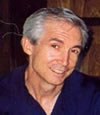EVOLUTION AND POLITICS
Robert J. Richards, Ph.D. - Morris Fishbein Professor of Science and Medicine,
Professor of History, Philosophy, and Psychology, and
Director of the Fishbein Center at the University of Chicago
Friday September 19, 2008
12:30-1:30 p.m.
Crawford Hall - Room 9
Inamori Center
Case Western Reserve University
Dear Colleagues,
In the United States, the politics of evolution has normally been seen as a conflict between conservative Christians and more liberal secularists. But theories of evolution have not always been applied in ways that modern liberals would applaud. From
"Social Darwinism" in the 19th century to theories of survival of the fittest races in the 20th, the concept of evolutionary competition can be given all sorts of political uses.
Professor Richards is one of the world's leading historians of the concept of evolution. His broader fields are the history and philosophy of biology and psychology. He will review some of the history of the politics of evolution in Europe and the United States, and then we can discuss past, present, and future.
As usual, we will gather in Room 9 of the Inamori International Center for Ethics and Excellence, on the lower level of Crawford Hall, for free cookies, beverages, and brown bag lunch.
Best regards,
Joe White
About Our Guest
Robert J. Richards does research on history and philosophy of biology and psychology, as well as on German Romanticism. This includes a particular interest in evolutionary biopsychology, ethology, and sociobiology. Concerning philosophic and metahistoric problems, he has argued for a revaluation of evolutionary ethics and have developed a natural selection model for historiographic analysis. His first book treats evolutionary theories of mind and behavior. That history discusses the period from the late 18th century to the present, but particularly focuses on the work of Charles Darwin. Other figures that receive major attention are: Herbert Spencer, George Romanes, Lloyd Morgan, William James, James Mark Baldwin, Konrad Lorenz, and Edward O. Wilson. In another book, Robert Richards has traced the gradual alteration in meaning of the concept of 'evolution' from the 17th century up to Darwin and contemporary neo-Darwinians. He argues that Darwin's own theory has a radically different character than usually thought. In another vein, he has written a history of German Romanticism during the period 1770-1830. Richards argues that the German Romantics held that aesthetic approaches to nature and scientific approaches were complementary, and that this conception had a powerful impact on both art and biological science of the period. Among the figures treated are: Novalis, the Schlegel brothers, Kant, Schelling, and Goethe. Most recently he has completed a book on German evolutionary theory, especially examining the trajectory of Ernst Haeckel; who was supposed to have committed egregious fraud and produced theories that led to the rise of Nazi biology. Richards disputes both of these contentions. Currently he is embarked on an historical and philosophical commentary on Darwin’s Origin of Species.
Friday Lunch Upcoming Topics and Speakers:
September 26: Ethical Responses to Terrorism with Shannon French Ph.D., Director, Inamori International Center for Ethics and Excellence.
October 3: Health Policy in the 2008 Election with Joe White, Professor of Political Science.
October 10: Presidential Ecotheologies with Tim Beal, Professor of Religion.
October 17: Biological Bases of Moral (or Immoral) Behavior, with Gary Marchant, Lincoln Professor of Ethics in Law and Emerging Technology, Arizona State University.
October 24: Seniors in the 2008 Election with Robert H. Binstock, Professor of Aging, Health and Society.
October 31: Halloween Special: Election Preview with Karen Beckwith, Professor of Political Science; Justin Buchler, Assistant Professor of Political Science; and Andrew Lucker, Adjunct Assistant Professor of Political Science.
November 7: Responding to the Foreclosure Crisis with Jim Rokakis, Cuyahoga County Treasurer.
November 14: Charging for Car Insurance by the Mile: Good Business and Good for Energy and the Environment? With Richard Hutchinson, General Manager for the “My Rate” program, Progressive Insurance.
November 21: TBA
November 28: Thanksgiving Break
December 5: TBA
The Friday Lunch discussions are held on the lower (ground) level of
Crawford Hall. Visitors with mobility issues may find it easiest to take advantage of special arrangements we have made. On most Fridays, a few parking spaces in the V.I.P. lot in between Crawford Hall and Amasa Stone Chapel are held for participants in the lunch discussion.
Visitors then can avoid walking up the hill to the first floor of Crawford by entering the building on the ground level, through the garage area under the building. The further door on the left in that garage will be left unlocked during the period before the Friday lunch. On occasion, parking will be unavailable because of other university events.
For more information about these and other Center for Policy Studies programs,
please see http://policy.case.edu.


